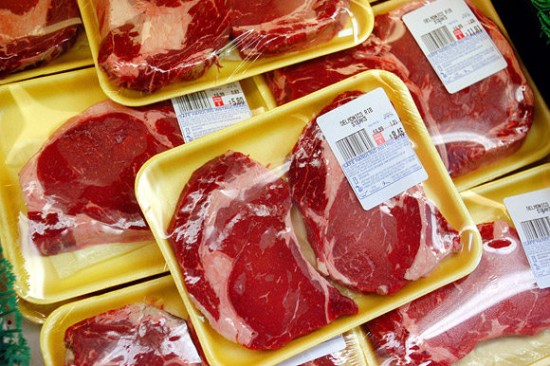All red meat is bad for you, new study says
By Eryn BrownLos Angeles Times
Eating red meat — any amount and any type — appears to significantly increase the risk of premature death, according to a long-range study that examined the eating habits and health of more than 110,000 adults for more than 20 years.
For instance, adding just one 3-ounce serving of unprocessed red meat — picture a piece of steak no bigger than a deck of cards — to one’s daily diet was associated with a 13% greater chance of dying during the course of the study.
Even worse, adding an extra daily serving of processed red meat, such as a hot dog or two slices of bacon, was linked to a 20% higher risk of death during the study.
“Any red meat you eat contributes to the risk,” said An Pan, a postdoctoral fellow at the Harvard School of Public Health in Boston and lead author of the study, published onlineMonday in the Archives of Internal Medicine.
Crunching data from thousands of questionnaires that asked people how frequently they ate a variety of foods, the researchers also discovered that replacing red meat with other foods seemed to reduce mortality risk for study participants.
Eating a serving of nuts instead of beef or pork was associated with a 19% lower risk of dying during the study. The team said choosing poultry or whole grains as a substitute was linked with a 14% reduction in mortality risk; low-fat dairy or legumes, 10%; and fish, 7%.
Previous studies had associated red meat consumption withdiabetes, heart disease and cancer, all of which can be fatal. Scientists aren’t sure exactly what makes red meat so dangerous, but the suspects include the iron and saturated fat in beef, pork and lamb, the nitrates used to preserve them, and the chemicals created by high-temperature cooking.
The Harvard researchers hypothesized that eating red meat would also be linked to an overall risk of death from any cause, Pan said. And the results suggest they were right: Among the 37,698 men and 83,644 women who were tracked, as meat consumption increased, so did mortality risk.
In separate analyses of processed and unprocessed meats, the group found that both types appear to hasten death. Pan said that at the outset, he and his colleagues had thought it likely that only processed meat posed a health danger.
Carol Koprowski, a professor of preventive medicine at USC’s Keck School of Medicine who wasn’t involved in the research, cautioned that it can be hard to draw specific conclusions from a study like this because there can be a lot of error in the way diet information is recorded in food frequency questionnaires, which ask subjects to remember past meals in sometimes grueling detail.
But Pan said the bottom line was that there was no amount of red meat that’s good for you.
“If you want to eat red meat, eat the unprocessed products, and reduce it to two or three servings a week,” he said. “That would have a huge impact on public health.”
A majority of people in the study reported that they ate an average of at least one serving of meat per day.
Pan said that he eats one or two servings of red meat per week, and that he doesn’t eat bacon or other processed meats.
Read More Here

No comments:
Post a Comment